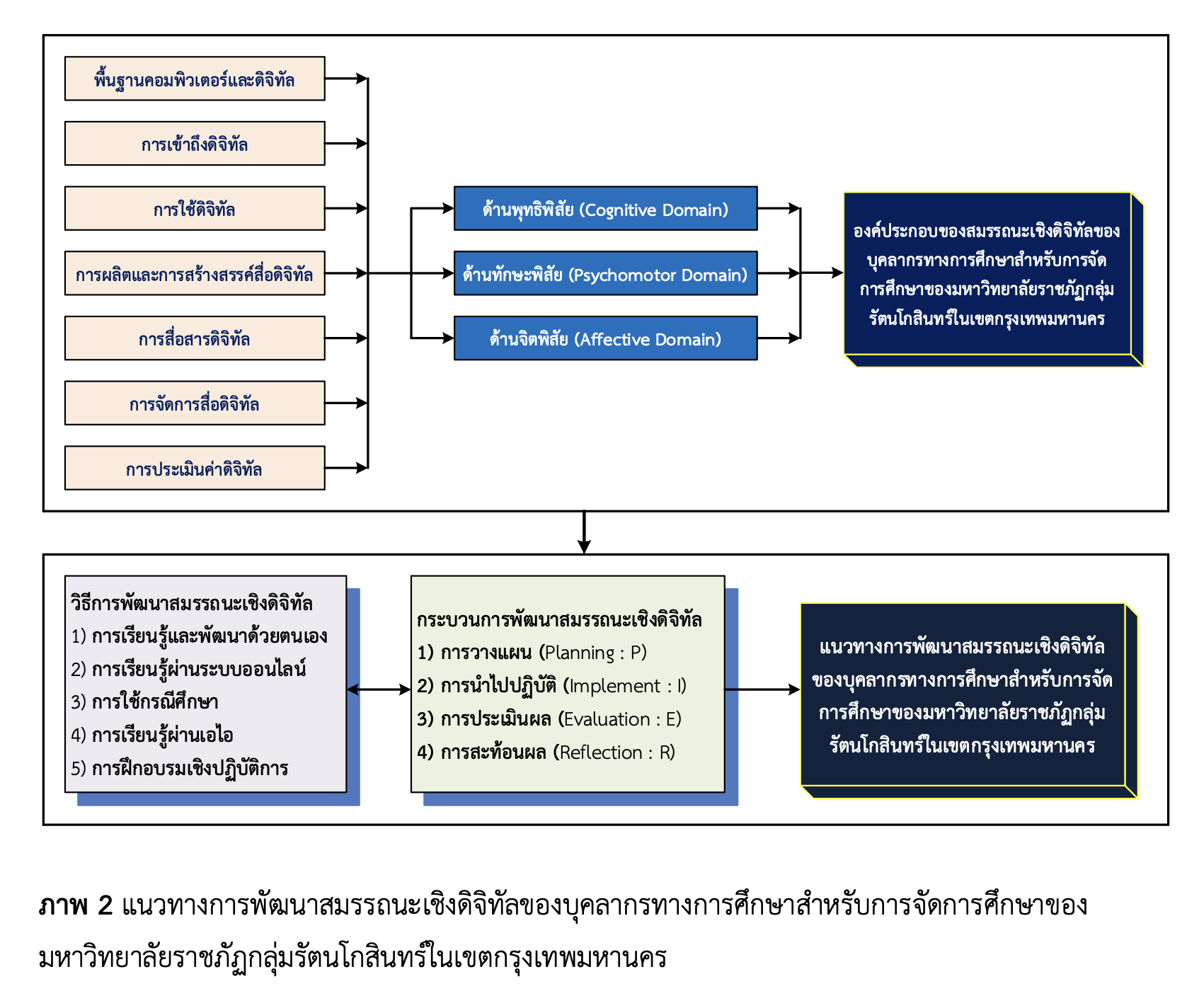แนวทางการพัฒนาสมรรถนะเชิงดิจิทัลของบุคลากรทางการศึกษาสำหรับการจัดการศึกษา ของมหาวิทยาลัยราชภัฏกลุ่มรัตนโกสินทร์ในเขตกรุงเทพมหานคร
Main Article Content
บทคัดย่อ
การวิจัยนี้มีวัตถุประสงค์เพื่อศึกษาคุณลักษณะ องค์ประกอบ และระบุแนวทางการพัฒนาสมรรถนะเชิงดิจิทัลของบุคลากรทางการศึกษาสำหรับการจัดการศึกษาของมหาวิทยาลัยราชภัฏกลุ่มรัตนโกสินทร์ในเขตกรุงเทพมหานคร โดยใช้ระเบียบวิธีการวิจัยแบบผสมผสาน วิธีดำเนินการวิจัยมี 4 ขั้นตอน ได้แก่ 1) การศึกษาคุณลักษณะ จากการวิเคราะห์เอกสาร และการสัมภาษณ์เชิงลึกผู้บริหาร จำนวน 10 คน 2) การวิเคราะห์องค์ประกอบ จากการสอบถามกลุ่มตัวอย่างบุคลากรทางการศึกษา ได้แก่ ผู้บริหาร อาจารย์ และบุคลากร จำนวน 558 คน ได้มาโดยการสุ่มตัวอย่างแบบหลายขั้นตอน 3) การตรวจสอบองค์ประกอบโดยใช้วิธีวิทยาวิจัยสามเส้าด้านข้อมูล และ 4) การนำเสนอแนวทางการพัฒนาโดยการสัมมนาอิงผู้เชี่ยวชาญด้านการบริหารงานอุดมศึกษา จำนวน 9 คน จากการเลือกผู้เชี่ยวชาญแบบเจาะจง เครื่องมือที่ใช้ในการวิจัย ได้แก่ แบบสัมภาษณ์เชิงโครงสร้าง แบบสอบถาม และแบบสนทนากลุ่ม การวิจัยนี้วิเคราะห์ข้อมูลเชิงคุณภาพด้วยการวิเคราะห์เนื้อหาแบบพรรณาและวิเคราะห์ข้อมูลเชิงปริมาณด้วยการแสดงองค์ประกอบเชิงสำรวจรวมถึงตัวบ่งชี้ ผลการวิจัยพบว่า คุณลักษณะของสมรรถนะเชิงดิจิทัลของบุคลากรทางการศึกษาสำหรับการจัดการศึกษาของมหาวิทยาลัยราชภัฏกลุ่มรัตนโกสินทร์ในเขตกรุงเทพมหานครมี 3 ด้าน ได้แก่ 1) ด้านการรู้ดิจิทัล 2) ด้านการใช้/การแก้ปัญหาด้วยเครื่องมือดิจิทัลดิจิทัล และ 3) ด้านการปรับตัวการเปลี่ยนแปลงดิจิทัล องค์ประกอบหลัก ได้แก่ 1) ด้านพุทธิพิสัย 2) ด้านทักษะพิสัย และ 3) ด้านจิตพิสัย แนวทางการพัฒนาประกอบด้วย 1) วิธีการพัฒนา 2) กระบวนการพัฒนา และ 3) ปัจจัยแห่งความสำเร็จในการพัฒนา
Downloads
Article Details

อนุญาตภายใต้เงื่อนไข Creative Commons Attribution-NonCommercial-NoDerivatives 4.0 International License.
The authors are solely accountable for the ideas and recommendations articulated in the articles published in The LEAD Journal RU. Should there be any inaccuracies, the authors accept full responsibility for such errors.
Moreover, the Editorial Board, Editorial Team, and Committee of The LEAD Journal RU are committed to maintaining the integrity of the principles reflected in the authors' contributions.
Consequently, Ramkhamhaeng University, the Editorial Board, Editorial Team, and Editors shall not be held liable for any outcomes arising from the authors' presentation of their ideas and recommendations within The LEAD Journal RU.
เอกสารอ้างอิง
Agila-Palacios, M. V., Muñoz-Repiso, A. G.-V., and Ramírez-Montoya, M. S. (2022). Influence of Active Methodologies: Projects and Cases in the Development of Digital Competences with Mobile Devices. Journal of Applied Research in Higher Education, 14(3), 1007-1020.
Anwar, S., and Saraih, U. N. (2024). Digital Leadership in the Digital Era of Education: Enhancing Knowledge Sharing and Emotional Intelligence. International Journal of Educational Management, 38(6), 1581-1611.
Carvalho, A., Alves, H., and Leitão, J. (2022). What Research Tells Us about Leadership Styles, Digital Transformation, and Performance in State Higher Education?. International Journal of Educational Management, 36(2), 218-232.
Lee, J. J., and Meng, J. (2021). Digital Competencies in Communication Management: A Conceptual Framework of Readiness for Industry 4.0 for Communication Professionals in the Workplace. Journal of Communication Management, 25(4), 417-436.
Ministry of Higher Education, Science, Research and Innovation. (2019). Higher Education Act B.E. 2019. Bangkok: Shipping and Parcel Printing Houses. [In Thai].
Ministry of Higher Education, Science, Research and Innovation. (2024). Action Plan to Drive and Promote the Utilization of Science, Research, and Innovation at the Regional Level for the Year 2024-2027. Retrieved from http://clinictech.ops.go.th/online/cmo/site_blog_show.asp?id=41. [In Thai].
National Information Technology Committee. (2019). The Essential Digital Competencies for Undergraduate Students in Thai Higher Education Institutions. Retrieved from http://https://www.incits.org/. [In Thai].
Parkatti, A., Saari, T., Tammelin, M., and Villi, M. (2022). Framing Digital Competence in Media Work – The Case of Finland. International Journal of Sociology and Social Policy, 42(13/14), 15-29.
Phakamach, P. (2023). Educational Innovation: Elements and Mechanisms for the Development of Thai Educational Institutions Towards Internationalization. Journal of Education and Innovative Learning, 3(2), 161-180. [In Thai].
Phakamach, P., Panjarattanakorn, D., and Onsampant, S. (2023). Conceptualization and Development of Digital Leadership to Drive Corporate Digital Transformation for Sustainable Success. International Journal of Educational Communications and Technology, 3(2), 27-39.
Phakamach, P., Senarith, P., and Wachirawongpaisarn, S. (2022a). ICT Systems Development Guidelines for Educational Innovation Management of Rajamangala University of Technology in Thailand. Journal of Education and Innovative Learning, 2(2), 109-130. [In Thai].
Phakamach, P., Senarith, P., and Wachirawongpaisarn, S. (2022b). The Metaverse in Education: The Future of Immersive Teaching & Learning. RICE Journal of Creative Entrepreneurship and Management, 3(2), 75-88.
Reddy, P., Sharma, B., Chaudhary, K., Lolohea, B., and Tamath, R. (2022). Information Literacy: A Desideratum of the 21st Century. Online Information Review, 46(3), 441-463.
Saib, M. O., Rajkoomar, M., Naicker, N., and Olugbara, C. T. (2023). Digital Pedagogies for Librarians in Higher Education: A Systematic Review of the Literature. Information Discovery and Delivery, 51(1), 13-25
Schiuma, G., Schettini, E., Santarsiero, F., and Carlucci, D. (2022). The Transformative Leadership Compass: Six Competencies for Digital Transformation Entrepreneurship. International Journal of Entrepreneurial Behavior & Research, 28(5), 1273-1291.
Yadav, A. K. S. (2022). The Essential Skills and Competencies of LIS Professionals in the Digital Edge: Alumni Perspectives Survey. Global Knowledge, Memory and Communication, 71(8/9), 837-856.
Zhan, H., Cheng, K. M., Wijaya, L., and Zhang, S. (2024). Investigating the Mediating Role of Self-Efficacy Between Digital Leadership Capability, Intercultural Competence, and Employability Among Working Undergraduates. Higher Education, Skills and Work-Based Learning, 14(4), 796-820.


